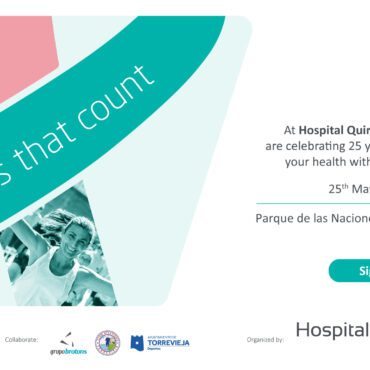-
 play_arrow
play_arrow
BayRadio Listen Live Broadcasting in Spain

Dr. Rodolfo Martín Díaz, head of the Gynaecology Service at Quirónsalud Torrevieja and Alicante, summarises the origin of this pathology and what surgery consists of to address it.
One of the malignant diseases that occupies the first places among female tumours is ovarian cancer. Its incidence in women is around 1.2% of the general female population, but if we take into account its age of onset, it will represent 5% of female tumours and the fourth most frequent.
In Spain, around 3,300 new cases are diagnosed annually, an incidence relatively higher than that of the world population (4%).
Despite its low incidence, it is still the leading cause of cancer death in women, with around 2,000 deaths per year.
Rodolfo Martín Díaz, head of the Gynaecology Service at Quirónsalud Torrevieja y Alicante, explains in greater detail what this disease consists of and how it can be treated. In addition, he specifies the average age of patients who suffer from it and when studies should begin for early detection of the disease.
Ovarian cancer and the patient’s age
Ovarian cancer is a disease more common in postmenopausal women, with the highest incidence between the ages of 50 and 75. In this sense, the average is around 63 years old. These purely statistical data only reflect the importance of regular check-ups after menopause.
Survival of ovarian cancer depends purely and exclusively on the stage or degree of progression that is diagnosed. The Quirónsalud professional explains that in stage I, the cure can reach 95%, while in stage II, it is 70% and in stage III, it is 30%. However, “unfortunately, most cases are diagnosed in stage III or IV. This is mainly due to the fact that it is a silent disease, which when it manifests it does so with symptoms that are mistaken between banal anomalies of the digestive tract, urological and gynaecological problems. Added to this, the lack of an accurate diagnostic imaging method leads to the vast majority of times being discovered in advanced stages.
Faced with this scenario, specific gynaecological check-ups from the age of 40 are very important, in which a gynaecological ultrasound will be performed to detect any abnormality in the ovaries. If there is a family history of ovarian cancer, screening should begin earlier.
Regarding the causes of ovarian cancer, a specific one is currently unknown, but there are a number of factors that reduce the incidence of ovarian cancer. These include pregnancy and the use of birth control pills.
More well-known, but rare, are hereditary syndromes that predispose to ovarian cancer due to mutations in some specific genes such as BRCA1 and BRCA2, linked to breast and ovarian cancer and other tumours (prostate, pancreas, melanoma).
More recently, other genes are also linked to ovarian cancer such as PTEN (PTEN tumour hamartoma syndrome), STK11 (Peutz-Jeghers syndrome), MUTYH (MUTYH-associated polyposis), and many genes that can cause hereditary nonpolyposis colorectal cancer or Lynch syndrome (MLH1, MLH3, MSH2, MSH6, TGFBR2, PMS1, and PMS2).
Treatments for Ovarian Cancer
The professional Díaz, from Quirónsalud Torrevieja and Alicante, says that ovarian cancer surgery differs in the early and advanced stages, but in all cases the objective is the same: to leave the patient without tumour remains.
In early stages I and II, minimally invasive surgery plays a fundamental role.
Minimally invasive surgery allows surgical procedures to be performed through minimal incisions in the skin, avoiding the opening of the abdomen. This is why post-surgical recovery is faster, less painful and associated with a lower risk of infection, allowing patients earlier mobility, incorporating into family, social and work life in a much shorter time than in the case of patients operated on by laparotomy.
Therefore, recovery after ovarian cancer surgery can vary significantly depending on several factors, such as the extent of the surgery, the stage of the cancer, the patient’s overall health. If the surgical approach is minimally invasive, recovery is much faster and less painful.
For advanced stages, in which treatment of the genital tract is required, but also digestive, urinary or peritoneal, the recommended route is the open route, sometimes intraperitoneal chemotherapy with hyperthermia may be added (HIPEC).
In these cases, the exposure of the abdomen is maximum so that both the upper and lower abdomen can be addressed and thus completely eliminate all visible tumour disease. Here, there is a higher incidence of post-surgical pain, surgical wound infections, bleeding, and limitation of early mobility. In the first case, the hospital stay is usually 2 days on average, while in the second it is approximately 7 days.
Finally, the professional maintains that: When ovarian cancer is suspected or diagnosed, patients should be referred to centres with experience and capacity. To have multidisciplinary teams and the appropriate technology, because the surgical treatment of ovarian cancer has only one surgical opportunity and the survival of our patients depends on it, which in the advanced stages can range from 72 months to 30 months, depending on the type of surgery we are able to perform.
You can request more information at Quirónsalud Torrevieja hospital about this disease or any other pathology.
Written by: BayRadio News
Similar posts
Recent Posts
- British buyers still top foreign home purchases in Spain: despite Brexit, UK leads the way in 2024
- Torrevieja unveils the charity race “5K Steps That Matter by Quirónsalud” in aid of AFECÁNCER
- Discover how breast reduction can transform your life: from pain to confidence
- Reclaim your shape, reclaim your confidence: The transformational power of a tummy tuck
- Magnetic Endoscopic Capsule: A Revolution in Digestive Diagnosis

Ctra. Cabo La Nao, CC La Nao, Local 6 03730 Javea, Alicante, Spain
Advertise with us
Do you have a business in Spain? Do you provide a service to the expat community in Spain? Would you like your message to reach over 500.000 people on a weekly basis?
BayRadio is a community orientated radio station offering fantastic content to our many listeners and followers across our various platforms. Contact us now and find out what Bay can do for you!
Our business is helping your business grow.
BAY RADIO S.L. © 2024. ALL RIGHTS RESERVED. WEB DESIGN BY MEDIANIC








